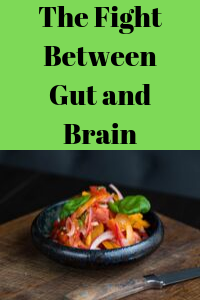by Ali Bates- Guest Post
Over 300 million people across the world experience depression, but many more than this also face mental health challenges on a regular basis. We live busy, stressful lives, and this can take its toll on our mental health. However, it isn’t just lifestyle that contributes to this: what we eat has more impact than we may realize. The link between gut health and mental health is often in the headlines, and there is strong evidence to suggest that regularly consuming gut-healthy foods can help us keep our mental health in check too.
The Gut-Brain Axis
The term, ‘gut-brain axis’ refers to the communication between the brain and the gastrointestinal tract. What we eat can alter the environment of the gut, which in turn can have an impact on the brain. A complex collection of microbes lives in the gut, and maintaining its health contributes to a healthy brain, and consequently, good mental health. When this collection of microbes – known as the microbiome – is out of balance, an abundance of unhealthy bacteria can grow and affect our mental health. There are many factors that can cause an imbalance in the gut, from antibiotics to chemotherapy, but one factor that is within our control is our diet. Similarly, our mood can affect our gut: the gastrointestinal tract is sensitive to our emotions, which is why feeling anxious, sad or angry can make us feel nauseous or uncomfortable.
What Depression Tells Our Gut
When we are affected by depression – or simply a dip in our mood – we naturally crave foods that give us a quick boost in pleasure. Often, this means highly processed foods, rich in sugar and trans fats. These foods are designed to be very tasty and make us feel better in the short term, but they can have a negative effect on the balance of bacteria in the gut, which can ultimately lead to us feeling worse. If we consume a lot of processed foods, whether they be in the form of salty snacks, cakes or processed white bread, we increase the population of unhealthy microbes in the gastrointestinal tract, leading to a decline in mood. This problem can be even worse if we also fail to consume foods that promote good gut health.
How To Make The Gut Answer Back
When we find ourselves craving highly processed foods in order to feel better, we can solve the problem by ignoring those cravings and instead feeding the gut with healthy, anti-inflammatory foods. Studies show that eating a healthy, balanced diet can help protect us against depression: maintaining a diverse population of healthy bacteria in the gut sends signals to our brain that help us stay in good mental health. Maintaining good gut health also has a knock-on effect on other areas of our wellness: many foods that promote a healthy gastrointestinal tract also keep our skin in good health, and make us less likely to develop diseases like diabetes and metabolic syndrome. We can protect our gut health – and therefore, our mental health – by following a diet rich in whole foods and containing plenty of fiber. Foods that are rich in probiotics (like natural yogurt) and fermented foods can also help redress the balance. The Mediterranean Diet is often referenced as a good diet for gut health, as it focuses on whole foods from all food groups, and naturally allows us to achieve the balance our gut needs.
Depression is a very serious illness, and cannot necessarily be solved by diet alone. However, the link between gut health and mental health means that we can help manage symptoms and take steps to promote improvements in mood by ensuring that our diet is gut-friendly, and allowing our microbiome to remain healthy and diverse.
Request a free foundations of wellness supplements kit.
Autoimmune Healing Blueprint Kit with Ebooks and Video
Did you find this helpful? Donate to help me be able to continue writing more content.
My Favorite Products (Affiliate links- if you make a purchase I may earn a small commission)
Thrive Market - healthy gluten free, sugar free and speciality online food and household products
Silk and Sonder Monthly Journals and Planners
My Portable Infrared Sauna
Self Care Journal
Olipop - healthy soda with probiotics and prebiotics
Digestion Kit
Stress Oils










